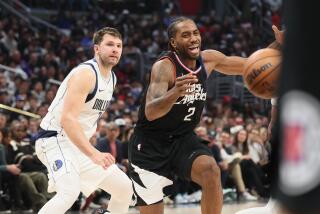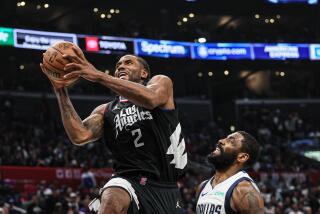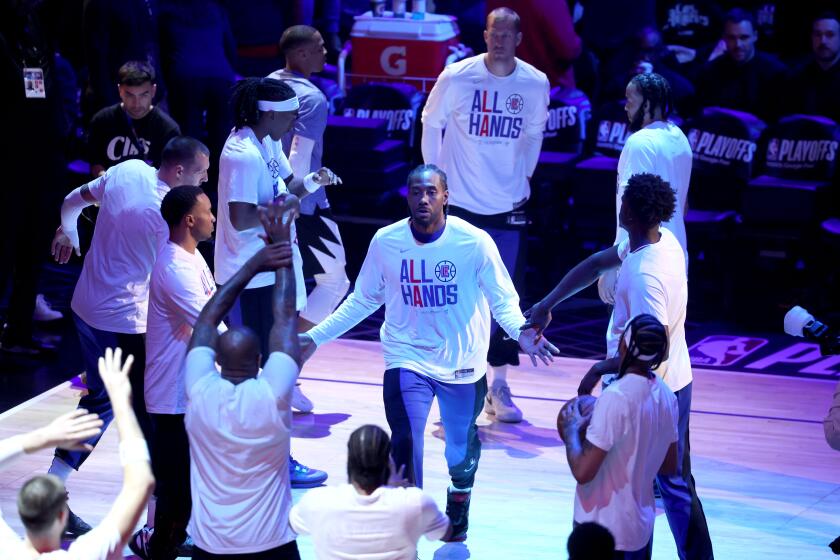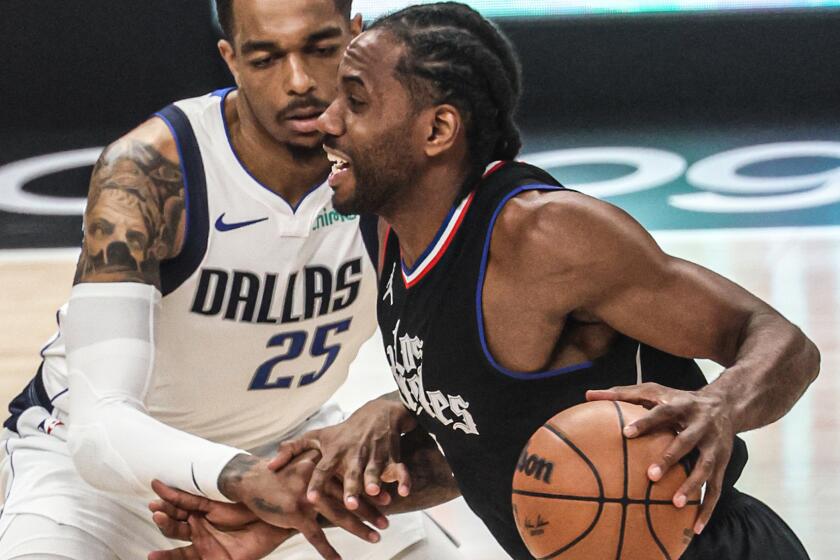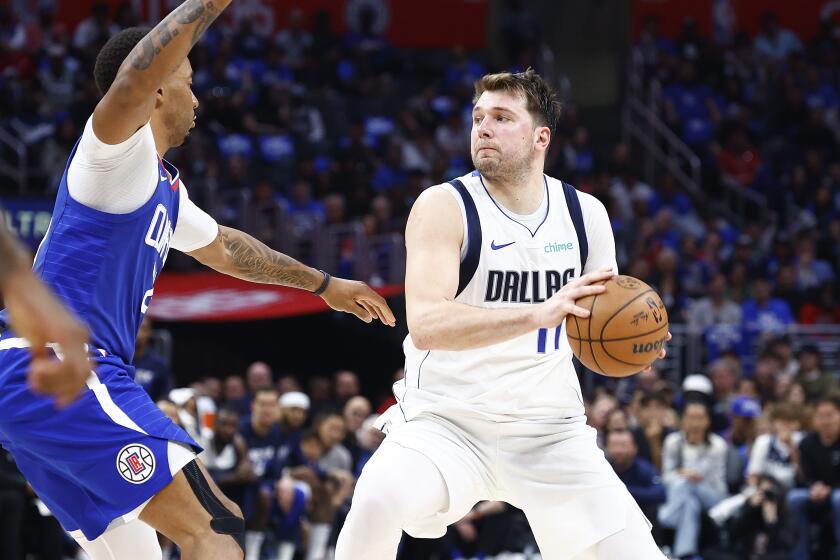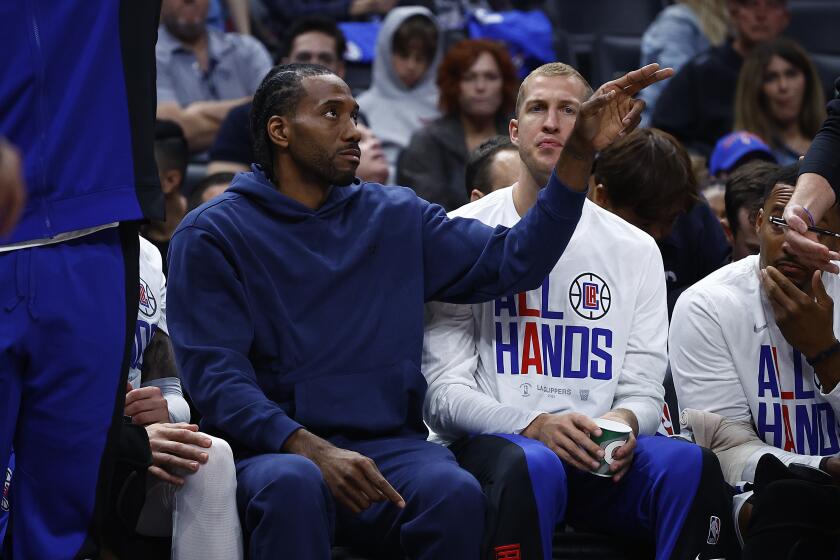Sadly, there won’t be any winners in suit
Only the Clippers, it seems, could be involved in a fight in which a fair outcome is unattainable, and a rooting interest is impossible.
It’s Elgin Baylor suing Donald Sterling, a fallen general manager charging the falling owner of being racist and cheap, allegations that apparently occurred to Baylor only after working there for more than two decades.
One cannot pick sides, only emotions.
Sadness comes to mind.
How do you back an owner who is now fighting two lawsuits accusing him of racism?
But how do you support an employee who clearly tolerated the climate in which the racism allegations occurred?
It is certainly much easier to boo the loser Sterling than the legendary Baylor, but, in this case, it’s hard to cheer either one.
“Elgin is old school,” said his lawyer, Carl Douglas.
Perhaps, but in holding a Beverly Hills news conference Thursday to stick a flame under his old boss, Baylor’s image is being remodeled by the hour.
You know what I wish?
I wish that when the Clippers stripped Baylor of his powers and offered him an ambassador job for less than half of his salary last summer, he would have simply walked quietly across town and joined the Lakers.
They would have hired him in a heartbeat. Baylor wouldn’t have been given a fancy title or big office, but he could have finished his career as he started it, on the court in Lakers togs, helping teach some of the team’s youngsters about Lakers toughness, just like Kareem Abdul-Jabbar.
It would have been a perfect ending for a wonderful 74-year-old story.
But, no. Baylor stalked away from the longest tenure of any active general manager -- 22 years -- and decided to get even.
He decided to file this lawsuit, so the Lakers couldn’t hire him, and the Clippers couldn’t properly honor him, and he’s been forced to spend the last months in unwarranted obscurity while waiting for this week’s bomb to drop.
One bang, really, and the rest is wispy, second-hand smoke.
The bang is, of course, race.
Sterling is accused of telling Baylor he wanted to fill his team with “poor black boys from the South and a white head coach.”
During negotiations with former star Danny Manning, Sterling is also charged with saying, “I’m offering a lot of money for a poor black kid.”
In summation, Baylor’s lawyers accuse Sterling of having a “vision of a Southern plantation-type structure.”
All of this fits the image created by another plaintiff in a lawsuit against Sterling -- the United States of America.
In 2006, the Justice Department filed a still-pending discrimination suit against Sterling for allegedly using race as a factor in filling some of his many apartment buildings.
The suit alleges that Sterling refused to rent to non-Koreans in Koreatown and to African Americans in Beverly Hills.
The suit alleges Sterling once said he did not like to rent to “Hispanics” because, “Hispanics smoke, drink and just hang around the building.”
Sterling also allegedly said, “Black tenants smell and attract vermin.”
The Baylor allegations fit neatly into a package with the previous charges which, if found true, should convince the NBA to force Sterling to sell the team immediately.
But in the case of Baylor, one thing is not so neat.
If he knew about this behavior, why did he keep working for the guy?
Manning left the Clippers in 1994. So, if Sterling indeed made these comments, Baylor worked at least 15 years for a guy who he knew judged players by their skin color and economic status.
If Sterling indeed ran a “plantation,” then wasn’t Baylor one of the foremen?
That’s not the Elgin Baylor that Lakers fans know.
That’s not the Elgin Baylor who once averaged 38.3 points a game during a season in which he missed nearly half the games because he was serving in the U.S. Army.
That’s not the Elgin Baylor who once fought for 61 points in an NBA Finals game, which stands as one of basketball’s great pressure records.
That Elgin Baylor would have stood up and stormed out at the first whiff of racial inequity, eventually joining one of many other organizations who would love to employ a Hall of Famer.
Wouldn’t he?
“You have to understand, Elgin is from a different era, he’s cut from a different cloth,” Douglas said. “He’s always been a team player. He’s never been one to complain, never one to rock the boat.”
He didn’t have to complain, he could have just left.
“But he didn’t have many options,” Douglas said. “He didn’t want to move, so he stuck around and hoped that things would improve.”
Baylor indeed stuck around, and Sterling stuck with him, and let’s face it: Baylor was employed long after others in his situation would have been fired.
In any sports organization, if you still have a job after making the playoffs three times in 22 years, you are either the owner or a member of his family.
It is safe to say that the Clippers treated Baylor like family, until the bitter end, when they finally forced him out, which leads to other complaints in the lawsuit.
Mostly, Baylor seems upset that Mike Dunleavy, a “Caucasian coach,” made more than $5 million a season while Baylor made around $350,000.
C’mon. Before Dunleavy signed his deal, he had other suitors, and Baylor didn’t, and that’s just the way the leverage game works.
Sadness, indeed.
If Sterling is the racist that he is painted in the allegations, he should have been forced to leave this town’s sporting landscape a long time ago.
If Baylor was that unhappy serving as Sterling’s general, he should never have stayed.
--
More to Read
Get our high school sports newsletter
Prep Rally is devoted to the SoCal high school sports experience, bringing you scores, stories and a behind-the-scenes look at what makes prep sports so popular.
You may occasionally receive promotional content from the Los Angeles Times.
